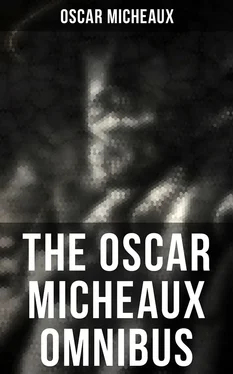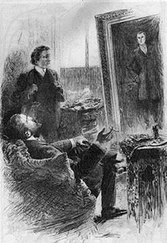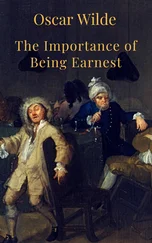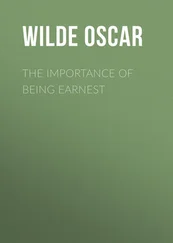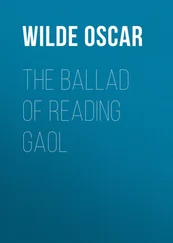Then she would tear into a string of abusive words. One day, after the doctor had been to the house, he called me aside and said:
"Oscar, your wife is physically well enough, but is mentally sick. Something should be done so that she may be more quiet."
"Is she quite out of danger?" I asked.
He replied that she was. That night I told my wife of our conversation and the next day I left for Megory county.
CHAPTER XXXVIII
SANCTIMONIOUS HYPOCRISY
Table of Contents
I was preparing to seed the biggest crop I had ever sown. With Orlean helping me, by bringing the dinner to the field and doing some chores, during the fall we had put the farm into winter wheat and I had rented the other Megory county farm. I hired a steam rig, to break two hundred acres of prairie on the Tipp county homesteads, for which I was to pay three dollars an acre and haul the coal from Colone, a distance of thirty-five miles, the track having been laid to that point on the extension west from Calias
I intended to break one hundred acres with my horses and put it into flax. I had figured, that with a good crop, it would go a long way toward helping me get out of debt. I worked away feverishly, for I had gotten deeper into debt by helping my folks get the land in Tipp county.
After putting in fifteen acres of spring wheat, I hauled farm machinery to my sister's claim, and then began hauling coal from Colone. It was on Friday. I was driving two horses and two mules abreast, hitched to a wagon loaded with fifty hundred pounds of coal, and trailing another with thirty hundred pounds, when one of the mules got unruly, going down a hill, swerved to one side, and in less time than it takes to tell it, both wagons had turned turtle over a fifteen-foot embankment and I was under eight thousand pounds of coal, with both wagons upside down and the hind wagonbox splintered almost to kindling. That I was not hurt was due to the fact that the grade had been built but a few days previously, had not settled and the loose dirt had prevented a crash. I attempted to jump when I saw the oncoming disaster, but caught my foot in the brake rope which pulled me under the loads.
A day and a half was lost in getting the wreck cleared so I could proceed to my sister's claim, from where I had intended going home to my wife, fifteen miles away. I had left the Reverend in charge after he and Ethel had said about all the evil things words could express, and he, finding that I was inclined to be peaceful, had shown his hatred of me in every conceivable manner, until Orlean, who could never bear noise or quarreling, decided it would be better that I go away and perhaps he would quit. I did not get home that trip on account of the delay caused by the wreck, but sent my sister with a letter, stating that I would come home the next trip, and describing the accident.
I went back to Colone, and while eating supper someone told me three colored people were in Colone, and one of them was a sick woman. I could hardly believe what I heard. My appetite vanished and I arose from the table, paid the cashier and left the place, going to the hotel around the corner, and there sat my wife. I went to her side and whispered:
"Orlean, what in heaven's name are you doing here? And why did you come out in such weather."
She was still very sick and wheezed when she answered, trembling at the same time:
"You said I could go home until I got well."
"Yes, I know," I answered, controlling my excitement. "But to leave home in such weather is foolhardy."
It had been snowing all day and was slippery and cold outside.
"And, besides," I argued, "you should never have left home until I returned. Didn't you get my letter?" I inquired, looking at her with a puzzled expression.
"No," she replied, appearing bewildered. "But I saw Ollie hand something to papa."
I then recalled that I had addressed the letter to him.
"But," I went on, "I wrote you a letter last week that you should have received not later than Saturday."
"I—I—I never received it," she answered, and seemed frightened.
I could not understand what had taken place. I had left my wife two weeks before, feeling that I held her affections, and had thought only of the time we'd be settled at last, with her well again.
The Reverend had said so much about her going home that I had consented, but had stipulated that I would wait until she was better and would then see whether we could afford it or not.
Suddenly a horrible suspicion struck me with such force as almost to stagger me, but calming myself, I decided to talk to the elder. He came in about that time and looked very peculiar when he saw me.
The town was full of people that night and he had some difficulty in getting a room, but had finally succeeded in getting one in a small rooming house, and to it we now helped Orlean, who was anything but well.
As we carried her, I could hardly suppress the words that came to my lips, to say to him when we got into the room, but thought it best not to say anything. Ethel, who was sitting there when we entered, never deigned to speak to me, but her eyes conveyed the enmity within. The Reverend was saying many kind words, but I was convinced they were all pretense and that he was up to some dirty trick. I was further convinced that he not only was an arrant hypocrite, but an enemy of humanity as well, and utterly heartless. When he and Ethel had entered our home three weeks before, neither shed a tear nor showed any emotion whatever, and had not even referred to the death of the baby, but set up a quarrel that never ceased after I went away.
"Reverend," I said. "Will you and Ethel kindly leave the room for a few minutes? I would like to speak with Orlean alone."
They never deigned to move an inch, but finally the Reverend said:
"We'll not leave unless Orlean says so."
In that moment he appeared the most contemptible person I ever knew. My wife began crying and said she wanted to see her mother, that she was sick, and wanted to go home until she got well. I was angry all over and turned on the preacher, exclaiming hotly:
"Rev. McCraline, I left you in charge of my wife out of respect for you as her father, but," here I thundered in a terrible voice, "you have been up to some low-lived trick and if I thought you were trying to alienate my wife's affections, or had done so, I would stop this thing right here and sue you, if you were worth anything."
At this he flushed up and answered angrily:
"I'm worth as much as you."
He was a poor hand at anything but quarreling, but knowing we'd make a scene, I said no more. It was a long night, Orlean was restless, and wheezed and coughed all through the night.
I have wondered since why I did not take the bull by the horns and settle the matter then, but guess it was for the sake of peace, that I've accepted the situation and remained quiet. I decided it would be best to let her go home without a big row, and when she had recovered, she could come home, and all would be well.
My wife had informed me that Claves kept up the house, paid for the groceries and half of the installments, while her father paid for the other half, but never bought anything to eat, nor sent any money home, only bringing eggs, butter, and chickens when he came into the city three or four times a year. But Claves' name was not on the contract for the home, only her father's name appearing. Her father was extremely vain and I had not pleased him because I was independent, and he did not like independent people. She also told me that her father always kept up a row when he was at home, but always charged it to everybody else.
The next morning, just before we started for the depot, I said:
"I'll step into the bank and get a check cashed and give Orlean some money. I haven't much, but I want her to have her own money."
Читать дальше
